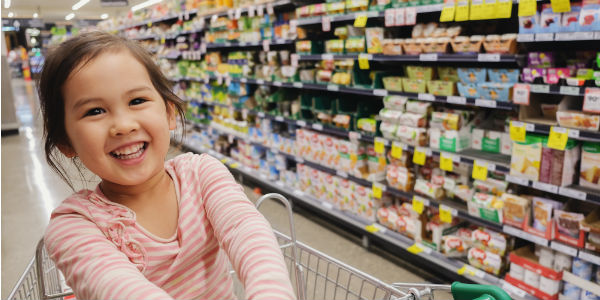Shopping at a store shouldn’t involve guesswork about whether a TV contains toxic flame retardants or a shampoo is made with hormone-disrupting chemicals. But the reality is that consumers are hard-put to make healthy decisions for their families because there are few restrictions on the toxic chemicals used in consumer products. The good news is that retailers are making progress in providing safer products for consumers. Which retailers are leading and which ones are lagging? The 2018 Mind the Store Retailer Report Card is out today with the answers, including for Washington State-based retailers Amazon, Costco, Starbucks and Nordstrom.
How Did Pacific Northwest Retailers Score?
The 2018 Retailer Report Card evaluated forty retailers for their actions on toxic chemicals. Some companies, including Apple, Target, Walmart and Ikea, earned top marks. But almost half of the retailers evaluated earned Fs for failing to address the chemical safety of the products they sell, including Washington state-based companies Starbucks and Nordstrom. These retailers lack even the most basic chemical policies to prevent the use of harmful chemicals in the products they sell. Join us in sending a message to Starbucks and Nordstrom urging them to step up and do better to protect customers.
The other Washington-based retailers evaluated – Amazon and Costco – fared better with C grades, showing considerable improvements since their failing grades in 2016.
Amazon made significant strides by developing its first-ever chemicals policy, with restrictions on 54 chemicals of high concern in its private-label products including baby, household cleaning, personal care, and beauty products. However, these guidelines do not apply to other brands, third-party sales, or packaging. It also doesn’t’ cover products such as electronics, which represent about 25% of sales for Amazon. Electronics are one of the largest uses of toxic flame retardants that contaminate our homes and environment. Read our analysis and opportunities for improvement here.
Costco has improved its score by developing Restricted Substances List for a number of product categories, including textiles and non-foods packaging. It also launched a Chemical Management Policy last year, which encourages suppliers to identify chemicals of concern and either remove them or make an informed substitution. It also asks that suppliers identify ways to change their manufacturing processes to reduce hazardous chemical use and encourages suppliers to attain qualified third-party green certifications.
Costco can continue to make progress by including other chemicals on its Restricted Substances List, such as PFAS chemicals. It can also set public goals with clear timelines for eliminating chemicals of high concern, and commit to completely eliminating BPA, PFAS, and phthalates from food packaging and food contact materials.
Retailers Move in the Right Direction on Toxic Chemicals
This year’s Retailer Report Card evaluated forty retailers and illuminated a number of emerging trends:
- Retailers are increasingly phasing toxic chemicals out of consumer products, such as the phthalates, parabens, and formaldehyde in personal care and beauty products, oxybenzone in sunscreens, and methylene chloride and NMP in paint strippers. Following outcry by families who have lost loved ones to exposure to methylene chloride-containing paint strippers, nine major retailers led by Lowe’s have committed to phasing out this dangerous chemical.
- More and more retailers are aligning around common chemicals of concern and tackling chemicals by class. In the past, chemicals have been substituted for similar chemicals which later are found to pose similar hazards. Rather than falling prey to this “whack-a-mole” approach to chemical substitution, retailers are taking a class-based approach by phasing out entire groups of closely related chemicals.
- Food retailers lag behind other retailers in eliminating toxic chemicals. The average grade for the restaurants evaluated was an F grade. Some grocery chains–like Whole Foods and Aldi–fared better due to their efforts to reduce toxics in personal care products, but they have so far neglected to ensure the safety of their food packaging or food contact materials.
- Too many retailers fail to address the chemical safety of their products. Nearly half of the retailers lacked even the most basic chemical policy, receiving F grades.
Now more than ever, we need companies to step up and tackle toxic chemicals. Retailers moving away from harmful chemicals not only protects public health, but helps change manufacturer policies by reducing demand for harmful chemicals and favoring safer alternatives.
Starbucks and Nordstrom are powerful companies with the ability to implement policies and practices to ensure the safety of their products. They definitely can do better.
Amazon and Costco made improvements, and they should be commended on their efforts. But there are many more opportunities for progress to be made! All four companies have enormous market power to require their suppliers to stop using harmful chemicals. With continued demand from consumers, these retailers can be encouraged to further their efforts to eliminate toxics in products on their store shelves and help move the market away from harmful chemicals.




